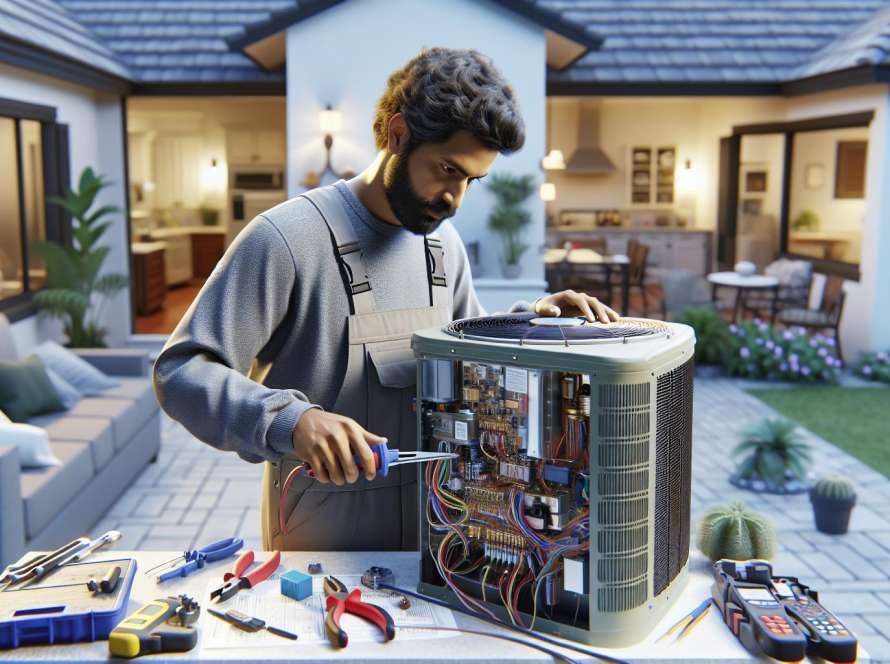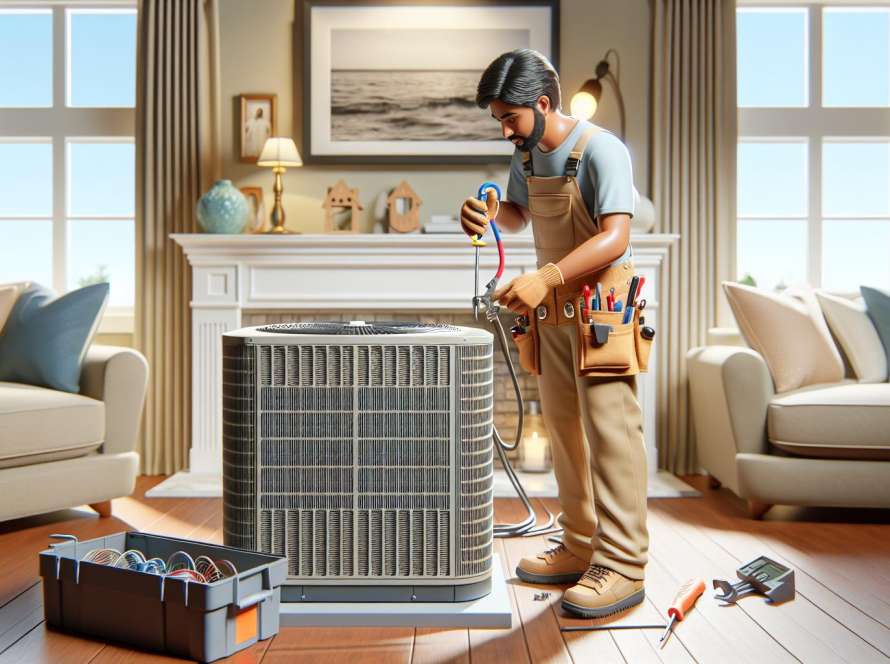So, you’re looking to beat the Florida heat and keep your cool, right? Well, optimizing your AC efficiency is the key to staying comfortable without breaking the bank. In the Sunshine State, where AC is a necessity rather than a luxury, making sure your system is running at its best is crucial. From battling the humidity to handling those scorching summer days, we’ve got the inside scoop on how to maximize your AC’s performance in Florida’s unique climate.
When it comes to AC efficiency in Florida, it’s not just about staying cool – it’s about saving energy and money too. With the right strategies and maintenance tips, you can ensure that your AC system is working efficiently, keeping you comfortable while lowering your utility bills. Let’s dive into the top ways to optimize your AC efficiency and beat the Florida heat like a pro.
Understanding Florida’s Climate
In Florida, the climate poses unique challenges when it comes to maintaining optimal AC efficiency. The state’s hot and humid conditions can put a strain on air conditioning systems. Here’s a breakdown of key factors to consider:
For Beginners: Grasping the Basics
- Humidity Levels: Florida is known for its high humidity, which can make the air feel hotter than it actually is.
- Temperature Fluctuations: The state experiences warm temperatures year-round, with occasional cold fronts in winter.
- Hurricane Season: Be mindful of hurricane season from June to November, which can impact energy usage and AC performance.
For Intermediate Users: Improving AC Performance
- Regular Maintenance: Schedule routine maintenance to ensure your AC system operates efficiently.
- Proper Insulation: Insulate your home to prevent cool air from escaping and reduce the workload on your AC.
- Programmable Thermostat: Invest in a programmable thermostat to adjust temperatures based on your schedule.
For Experts: Advanced Strategies for AC Optimization
- Energy-Efficient Upgrades: Consider upgrading to an energy-efficient AC unit to reduce energy consumption.
- Ductwork Inspection: Have your ductwork inspected for leaks or blockages that can affect airflow.
- Smart Home Integration: Explore smart home technology to control your AC remotely and optimize energy usage.
| Average Temperature | Humidity Levels | Hurricane Season |
|---|---|---|
| 80-90°F | High | June-November |
By understanding Florida’s climate and implementing the right strategies, we can ensure our AC systems perform optimally in the face of the state’s unique weather conditions.
Factors Affecting AC Efficiency in Florida

In a state like Florida, where the climate can be unforgiving, several key factors can impact the efficiency of your air conditioning system. Understanding these factors is essential for ensuring optimal performance and cost-effectiveness. Let’s delve into the specifics based on different experience levels:
For Beginners: Understanding the Basics
- High Humidity: Florida’s humidity levels can strain AC systems, making them work harder to cool the air.
- Consistent Warm Temperatures: The state’s year-round warm weather means AC units are in constant use, leading to wear and tear.
- Hurricane Season: Power outages during hurricanes can affect AC operation and performance.
For Intermediate Users: Enhancing Your System
- Regular Maintenance: Schedule bi-annual maintenance to keep the AC system running efficiently.
- Proper Insulation: Ensure your home is well-insulated to prevent cool air from escaping and hot air from entering.
- Programmable Thermostats: Invest in a programmable thermostat to regulate temperatures and save energy.
- Energy-Efficient Upgrades: Consider upgrading to a high-efficiency AC unit to save on energy costs.
- Ductwork Inspections: Regularly inspect and seal ductwork to avoid air leaks and maximize efficiency.
- Smart Home Integration: Explore smart technology options to control your AC system remotely and optimize energy usage.
By recognizing and addressing these factors, we can optimize our AC efficiency in Florida’s challenging climate conditions.
Proper Sizing and Installation of AC Systems
When it comes to optimizing AC efficiency in Florida’s climate, proper sizing and installation are crucial components. Getting this right from the start can significantly impact the performance and longevity of your air conditioning system. Here’s a breakdown of recommendations based on different experience levels:
For Beginners: Mastering the Basics
- Consult a Professional: Start by seeking expertise from a qualified HVAC technician to assess your home’s specific cooling needs.
- Right Size Matters: Ensure the AC system you install is the right size for your space to avoid inefficiencies and potential breakdowns.
- Quality Installation: Invest in professional installation to guarantee optimal performance and avoid common issues associated with DIY installations.
- Sealing and Insulation: Check for proper sealing and insulation in your home to prevent air leaks that can compromise efficiency.
For Intermediate Users: Enhancing Your System
- Regular Maintenance: Schedule routine maintenance to keep your AC system running smoothly and catch potential issues early.
- Programmable Thermostats: Consider upgrading to a programmable thermostat to regulate temperatures efficiently, especially when you’re away.
- Energy-Efficient Upgrades: Explore energy-efficient upgrades like variable-speed motors or smart HVAC systems for enhanced performance.
- Ductwork Inspections: Have your ductwork inspected for leaks and blockages that can reduce airflow and strain your system.
- Smart Home Integration: Integrate your AC system with smart home technology for convenient control and energy savings.
- Load Calculations: Conduct detailed load calculations to determine the exact cooling requirements of your space for precision sizing.
- High-Efficiency Units: Opt for high-efficiency units that meet ENERGY STAR standards for maximum energy savings and eco-friendliness.
- Duct Design Optimization: Focus on optimizing duct design for proper airflow distribution and reduced energy loss.
- Zoning Systems: Implement zoning systems to cool specific areas independently, optimizing comfort and energy usage.
- Professional Audits: Consider professional energy audits to identify areas for improvement and maximize overall efficiency.
By addressing proper sizing and installation considerations at each experience level, we can ensure that your AC system operates at its best in Florida’s challenging climate.
Regular Maintenance Tips for Improved Efficiency
For Beginners: Getting Started on the Right Foot
- Change air filters regularly to maintain proper airflow and improve indoor air quality.
- Inspect outdoor unit for debris and vegetation, ensuring unrestricted airflow.
- Clean evaporator and condenser coils to enhance cooling efficiency.
- Check thermostat settings for optimal comfort and energy savings.
- Schedule professional maintenance at least once a year for thorough system evaluation.
For Intermediate Maintenance: Taking It Up a Notch
- Invest in a programmable thermostat for automated temperature adjustments.
- Seal ductwork leaks to prevent air loss and improve system efficiency.
- Consider upgrading to energy-efficient equipment for long-term savings.
- Schedule bi-annual HVAC tune-ups to address minor issues before they become major problems.
- Monitor refrigerant levels to ensure proper AC operation and efficiency.
- Perform regular load calculations to ensure the AC unit is appropriately sized for your space.
- Opt for high-efficiency units for maximum energy savings and performance.
- Optimize duct design to minimize air leakage and improve airflow distribution.
- Implement zoning systems to customize cooling based on specific areas or zones.
- Consider professional energy audits for a comprehensive evaluation of your system’s efficiency.
| Fact | Data |
|---|---|
| Average AC system lifespan | 10-15 years |
| Optimal indoor humidity levels | 30-50% |
| Potential energy savings with regular maintenance | Up to 30% |
| Recommended frequency for air filter replacement | Every 1-3 months |
Energy-Efficient Cooling Strategies for Florida

For Beginners: Getting Started on the Right Path
- Start with Regular Maintenance – Ensure to change air filters frequently.
- Inspect Outdoor Units – Keep outdoor units clean and free of debris to maintain efficiency.
- Clean Coils Regularly – Dust and dirt can build up, affecting performance.
- Check Thermostat Settings – Optimal settings can make a significant difference in energy usage.
- Schedule Annual Professional Maintenance – Professional check-ups can help catch issues early on.
For Intermediate Users: Taking it Up a Notch
- Invest in Programmable Thermostats – Set schedules to match your daily routines.
- Seal Ductwork Leaks – Prevent air leaks and enhance efficiency.
- Upgrade to Energy-Efficient Equipment – Consider newer models for improved performance.
- Schedule Bi-Annual Tune-Ups – Regular maintenance can extend the life of your system.
- Monitor Refrigerant Levels – Low levels can affect cooling efficiency.
- Conduct Load Calculations – Ensure your system matches your home’s needs.
- Choose High-Efficiency Units – Invest in units with high SEER ratings for energy savings.
- Optimize Duct Design – Properly designed ductwork can enhance airflow.
- Implement Zoning Systems – Control different areas of your home separately for efficiency.
- Consider Professional Energy Audits – Get detailed insights into your home’s energy usage.
By following these tailored strategies, Florida residents can optimize their air conditioning efficiency based on their experience levels.
Conclusion
In Florida’s climate, optimizing AC efficiency is crucial for comfort and cost savings. By following tailored strategies based on experience levels, we can enhance cooling performance and prolong system lifespan. From basic maintenance to advanced techniques like load calculations and zoning systems, there are options for everyone. These energy-efficient practices not only improve indoor comfort but also contribute to a greener environment. Stay proactive in managing your AC system to enjoy a cool and efficient home year-round. Remember, a well-maintained AC system is a happy AC system.

